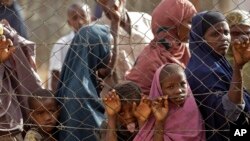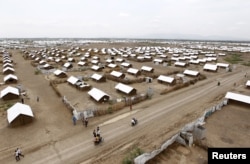The United Nations refugee agency is calling on Kenya to reconsider its plans to close the country's two main refugee camps, saying the move would have "devastating consequences" for hundreds of thousands of people.
UNHCR said in a statement Monday that it viewed the plans by Kenya's government with "profound concern." It urged the government to "avoid taking any action that might be at odds with its international obligations" and said the safety of hundreds of thousands of refugees hinges on Kenya's generosity.
Kenya announced Friday that it would close the Dadaab and Kakuma refugee camps "within the shortest time possible," citing security concerns, particularly from al-Shabab, a Somali-backed Islamist group that has carried out several mass attacks in Kenya. It said that hosting the refugees, who are mostly from Somalia, posed "immense security challenges."
The two-page statement stopped short of saying refugees would be expelled. However, it said the government has disbanded its Department of Refugee Affairs as a first step, and is working on a mechanism to close the camps.
Dadaab, in northeast Kenya, is considered the world's largest refugee camp and currently houses nearly 330,000 people, mostly Somalis. Kakuma, in northwestern Kenya, is home to another 55,000.
Kenya's government Friday acknowledged its decision will cause harm to the refugees and said the international community must take steps to minimize their pain and suffering.
The country hosts about 600,000 refugees in all. About three-fourths are from Somalia, with most of the others coming from South Sudan.
Kenya's government has threatened to close the refugee camps in the past, but never followed through.
Al-Shabab has carried out several major attacks on Kenyan territory, most notably the 2013 attack on Nairobi's Westgate Mall that killed 67 people and the 2015 attack on a college in the town of Garissa that killed 148.
Al-Shabab began launching attacks in Kenya after Kenyan troops entered Somalia to fight the militant group in 2011.






